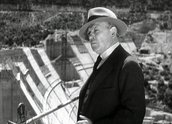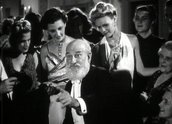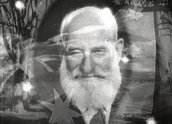


Dad Rudd, MP (1940)
Synopsis
The Rudds are modernising the farm, with unpredictable results. Dad Rudd (Bert Bailey) sets off to buy a new car and returns with an ancient horse-drawn fire-engine. Dave (Fred MacDonald) installs a new gas-powered stove for Mum (Connie Martyn), but almost blows the kitchen apart. Dad clashes with his neighbour Henry Webster (Frank Harvey) over the height of a major dam that is still under construction. When the local member of the state parliament dies, Dad and Webster stand against each other for the seat. Webster’s camp uses every dirty trick to stop Dad Rudd’s campaign. With the help of the Rudd’s old friend Mr Entwhistle (Alec Kellaway), Dad responds with some tricks of his own. On polling day, a major flood traps workers on the wrong side of the dam. As the dam threatens to give way, Jim Webster (Grant Taylor), Henry’s son, and Ann Rudd (Yvonne East) put aside their differences to help rescue the stranded workers. Dad Rudd is elected. In his maiden speech to parliament, Dad gives a rousing speech that foreshadows the coming war.
Curator’s notes
This is the final Cinesound feature, if not Ken Hall’s last picture. He made Smithy in 1946, but for Columbia Pictures. Dad Rudd’s speech about the drums of war (clip three) was not quite as prescient as it might seem now. Australia had been at war for six months when the film was being shot in early 1940, but the speech gives us a sense of Ken Hall’s own feelings at the time.
Hall had made 16 feature films at Cinesound between 1932 and 1939, none of which had lost money. Apart from Strike Me Lucky (1934) – which broke even – most of the films made a considerable profit for the parent company, Greater Union. Indeed, Cinesound helped to keep that company from going under in the Depression. Hall kept a studio full of technicians in work for most of the decade, when a third of Australians were out of work. More importantly, his films, most of which were comedies, kept Australians laughing. They helped to define the Australian character as a resilient and resourceful survivor, a potent message in those times.
No one in Australian movies defined these characteristics more than Dad Rudd, as played by Bert Bailey. Although born in Auckland, New Zealand, in 1868, Bailey came to Sydney as a child, with his mother, in 1871. He started in vaudeville, wrote plays with fellow actor Edmund Duggan and directed his first film in 1910 (called The Squatter’s Daughter and based on his and Duggan’s play – which was filmed again in 1933, by Ken Hall). Their play of On Our Selection, based loosely on the stories of Arthur Hoey Davis ('Steele Rudd’), premiered in 1912, with Bailey as Dad Rudd, the role that came to define him. Bailey was 43 when he first played him. He continued to play him until 1940, when he made Dad Rudd, MP, at the age of 71, after which he retired.
In his autobiography, Directed by Ken G Hall (1977), Hall wrote that he didn’t know this was to be the last Cinesound film, although he must have suspected. The war required men and materials – and some of the raw materials of film were used to make explosives. Raw film stock became scarce and would be required for propaganda purposes. Hall wrote that the head of Greater Union, Norman Rydge, told him in June 1940, soon after the highly successful release of this film, that production at Cinesound must cease for the duration of the war. 'I knew this was true. But what the decision implied was a crushing blow. It meant the breaking up of a fine production crew, a great bunch of people who had become personal friends.’
It also meant the end of the only continuously operating movie production company in Australia at the time. A handful of Australian films were made during the Second World War, but most of what the public went to see during these years was Hollywood fare. The war stimulated a huge resurgence in cinema going in Australia, peaking in 1944-45 with 151 million admissions (at a time when the population of Australia was about seven million), but there were few Australian films to take advantage of it. Greater Union and all Australian theatre owners enjoyed boom times, but with American films. The war helped to kill off most Australian cinema production for the next 20 years.
In that sense, Dad Rudd, MP does truly signal the end of an era, the last gasp of the cycle of rural comedies featuring yokels and livestock that went back 30 years in Australian cinema. It’s clear that Ken Hall felt the formula was tired, because of the way he tried to change it in the last two Dad and Dave films. The Rudds spent most of Dad and Dave Come to Town (1938) in the city, amid plush settings and swanky fashions. In the final film, the question of where they belong becomes a central issue of the plot. Dad Rudd, MP is partly about class divisions, because Dad’s opponent in the election is an aristocratic, if crooked, toff. Henry Webster, played by Frank Harvey, believes the seat in parliament is his by right of birth – he’s literally a born-to-rule conservative. Webster humiliates Rudd at a formal party by accusing him of gatecrashing. Neither man realises they have been pawns in a dispute about love, in which Mrs Webster has secretly invited the Rudds to the party in order to make it clear they don’t belong at such a society event. This sort of class conflict was common in Cinesound films, partly because it was popular with Australian audiences. English actor and playwright Frank Harvey usually played the offensive party – an Australian or English snob (as in It Isn’t Done, 1937).
Cinesound films were rarely directly political, but we get a clearer sense of Ken Hall’s largely anti-conservative politics in Dad Rudd, MP. Dad Rudd is for the communal, over the individual; the agrarian socialist principles of water for everyone, rather than to privilege a few. He distrusts the city and 'society ways’, as he makes clear in clip one, even though he’s quite capable of holding his own in city company. The character had come a long way from the hard-scrabble farmer that Bailey played in On Our Selection (1932) eight years earlier. The Rudds in this final film are not yokels – at least not for long, after the usual hijinks of the first reel. They have taken charge of the land that threatened to defeat them; they are now prosperous and acquisitive, buying the new modern conveniences. The final act is to take political power and to exert their influence on a wider stage, for what they firmly believe is the common good.
Dad Rudd’s progression to power isn’t simply about his rural family’s greater confidence and maturity. It’s about Australia’s projection of itself overseas in the context of the war. Dad stands up against the tyrant in his midst, as thousands of Australian soldiers are being mobilised to fight in the Middle East, against the Nazi tyrant. The climactic scene, as the dam is bridged by a flying fox, is a fairly clear military allegory – all hands to the fore, both men and women, to get a difficult and hazardous job done.
- Overview
- Curator’s notes
- Video 3 clips
- Principal credits
- Find a copy
- Comments 2
- Map
- Reviews 2



